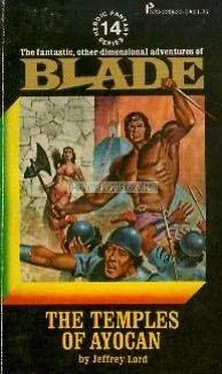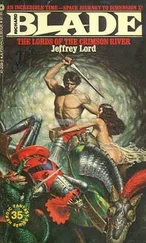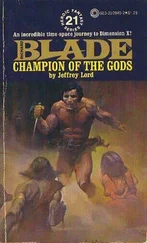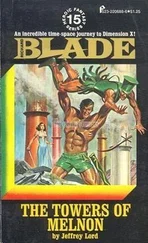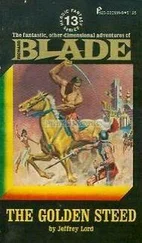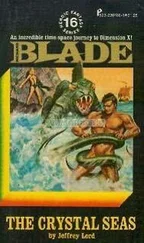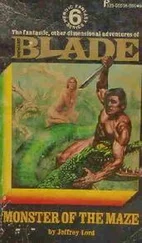Джеффри Лорд - The Temples Of Ayocan
Здесь есть возможность читать онлайн «Джеффри Лорд - The Temples Of Ayocan» весь текст электронной книги совершенно бесплатно (целиком полную версию без сокращений). В некоторых случаях можно слушать аудио, скачать через торрент в формате fb2 и присутствует краткое содержание. Год выпуска: 1975, ISBN: 1975, Издательство: Pinnacle Books, Жанр: Героическая фантастика, на английском языке. Описание произведения, (предисловие) а так же отзывы посетителей доступны на портале библиотеки ЛибКат.
- Название:The Temples Of Ayocan
- Автор:
- Издательство:Pinnacle Books
- Жанр:
- Год:1975
- ISBN:0523006233
- Рейтинг книги:3 / 5. Голосов: 1
-
Избранное:Добавить в избранное
- Отзывы:
-
Ваша оценка:
- 60
- 1
- 2
- 3
- 4
- 5
The Temples Of Ayocan: краткое содержание, описание и аннотация
Предлагаем к чтению аннотацию, описание, краткое содержание или предисловие (зависит от того, что написал сам автор книги «The Temples Of Ayocan»). Если вы не нашли необходимую информацию о книге — напишите в комментариях, мы постараемся отыскать её.
The Temples Of Ayocan — читать онлайн бесплатно полную книгу (весь текст) целиком
Ниже представлен текст книги, разбитый по страницам. Система сохранения места последней прочитанной страницы, позволяет с удобством читать онлайн бесплатно книгу «The Temples Of Ayocan», без необходимости каждый раз заново искать на чём Вы остановились. Поставьте закладку, и сможете в любой момент перейти на страницу, на которой закончили чтение.
Интервал:
Закладка:
He was not going to escape from the barge with the river swarming with those little monsters. He would have to wait until they landed at wherever they were going. The place of the High Sacrifice to Ayocan, Tzakalan? Probably.
But he was not going peacefully if he could not escape before the moment of sacrifice. He would take as many of «mighty» Ayocan's servants with him as he could-starting with Pterin.
Chapter 8
It took seven days and seven nights of travel down the Low River to reach Tzakalan, capital of the Kingdom of Chiribu. They passed isolated huts perched on poles along the banks, an occasional village, and once a large town with a temple mound outside it and half a dozen boats tied up at its pier. There was remarkably little traffic on the river, but what there was went in stout-sided barges like the one carrying Blade. On this river an upset or leaky boat would be an instant death sentence for anybody in it.
Most of the way, though, Blade saw nothing but the muddy brownish-green of the river and the various shades of green in the forest along its banks. Once more, his worst enemy was sheer boredom-that, and indigestion from eating too much hot heavy food when he didn't really want to.
By evening on the sixth day the scene on the bank was beginning to change. More boats were passing on the river or tied up at solid stone jetties, and there were more and larger houses, many of them with wide areas of cultivated land around them. At intervals there were sizable towns, of perhaps five or ten thousand people, with bustling markets piled high with colorful produce and baskets of squawking fowl. Blade could see no domestic animals larger than goats and dogs-no cattle, no draught animals.
And there was always a temple mound of Ayocan somewhere just outside each town, always visible from the river, always with its priests in their yellow-orange robes scurrying up and down it like ants on an anthill. Blade began to realize just how powerful and widespread the cult of Ayocan was in the whole of Chiribu, if not in this whole dimension. This might well make escaping difficult. Who would want to shelter a fugitive from the powerful-and ruthless-priests of mighty Ayocan? That would certainly be displeasing to Ayocan. And Ayocan shall not be displeased.
All during the seventh day the country grew more and more thickly populated. The towns were closer together and larger, and what space on the banks they did not occupy was taken up by sprawling estates and peasants' fields. Once two large towns on opposite sides of the river were linked by a bridge of old boats, lashed together with a plank walkway laid across them. All the traffic across the bridge was foot traffic, Blade noticed, and all the burdens seemed to go on the backs of men and women, some in chained gangs of slaves, others walking alone and apparently free. Still no domestic animals larger than household pets and fowl. Chiribu seemed to be like one of the civilizations of the American Indians before the arrival of the Europeans.
Two boats in the center of the bridge were untied to create a gap. The cult vessel slipped through the gap and on down the river. By nightfall on the seventh day there were so many boats around them on the river that it was almost like being in a city. Lights, voices, occasionally the sound of drums or flutes came across the water. Blade went to sleep with those in his ears, along with the perpetual creak of the sail and the slunk-slunk of the endlessly moving sweeps.
The next morning they reached Tzakalan.
Blade's first impression was a massive square solidness. The people who built Tzakalan could not build very high-Blade did not find a single building more than three floors tall. But they built solidly, as though they were trying to imitate natural features of the landscape and make their city last as long as the ground it was built on. Every building followed more or less the same square plan, although some had balconies and some had arcades. Every one seemed built of gigantic blocks of the same roughly dressed stone.
If the buildings of Tzakalan lacked grace, they more than made up for it in color. Blue, green, purple, orange, red, yellow (not the yellow-orange of the cult of Ayocan), black, and every possible and impossible shade and variation of them. In the bright sunlight pouring down on the city, the effect was dazzling and dizzying.
The boat was tied up at a small pier painted blue and white, where the men who ran to take the lines wore the dress of Holy Warriors. Even a private dock, thought Blade. The cult of Ayocan is certainly a state within a state. I wonder what the people think of that. If they don't like it. .
But that was definitely letting his mind run ahead of things. First he had to find a chance to escape, then succeed in escaping, then worry about helping these people shake off the cult of Ayocan-if they wanted to. He would have to be careful here. What seemed to him like brutality and cruelty in the cult of Ayocan might be something perfectly reasonable and normal in the eyes of the people here. If he started shooting off his mouth about their pet god, he might find himself slaughtered even faster than the priests could have done, and with less ceremony or chance of escape.
Except that right now his chances of escape from the priests didn't look particularly good, either. The Holy Warriors had him completely surrounded before the boat bumped against the pier-a dozen of them, all with swords and axes drawn. He might free himself, but he was almost certain to be wounded in the attempt. If he were blemished by a wound and recaptured, they would kill him on the spot, not wait anymore to sacrifice him to Ayocan. And if he were wounded, he most likely would be recaptured. Once again this was the wrong time and the wrong place for escape.
They did not bind Blade and carry him along on a litter this time. Instead they bound his arms behind his back and tied his ankles together with a short hobble of heavy bronze chain. He could walk briskly, but there wasn't any hope of his being able to run fast enough to get away from an old lady with a cane, let alone a dozen Holy Warriors and perhaps the whole population of Tzakalan.
So Pterin and the Holy Warriors escorted Blade through the streets of Tzakalan. The streets were wide and straight. The people flowing up and down them gave way before the little procession and left it a clear path. The civilian population of Tzakalan did not seem much different from the Holy Warriors when seen close up. They were all lean, wiry, with reddish brown skins, large flat noses, and straight black hair. The men wore cotton or linen kilts, the women long, loose sleeveless gowns of the same materials. Both sexes went barefoot, and Blade noticed that none of the men seemed to be armed.
The air in the city was close and heavy after the open river. Smells hung heavy in it-garbage, human and animal wastes, mud, wood smoke, a dozen others, most of them unpleasant. It wasn't quite as bad as the temple mound by the lake or the slave hold of the boat, but Blade found his nose wrinkling nonetheless as they marched him along.
Suddenly it struck him-one more smell, faint under all the others but unmistakable. He had smelled it too many times, in too many strange places after too many acts of violence. Decay-human decay. And the odor was growing stronger.
Ahead was a section of street where the people huddled close to the walls. In the middle of the street was a patch of white, and on the patch something black and sprawling. Blade knew what it was even before the procession took another step toward it.
How long the man had been dead, Blade couldn't be sure. In this damp climate only a little short of being tropical, decay would set in fast. Bloating and darkening were already well advanced. So was the smell. And there was something carved deep into the man's chest. While Pterin stopped the procession and chanted over the body, Blade had a good look at the blood-caked carving. Unmistakably, it was a stylized pair of bat wings.
Читать дальшеИнтервал:
Закладка:
Похожие книги на «The Temples Of Ayocan»
Представляем Вашему вниманию похожие книги на «The Temples Of Ayocan» списком для выбора. Мы отобрали схожую по названию и смыслу литературу в надежде предоставить читателям больше вариантов отыскать новые, интересные, ещё непрочитанные произведения.
Обсуждение, отзывы о книге «The Temples Of Ayocan» и просто собственные мнения читателей. Оставьте ваши комментарии, напишите, что Вы думаете о произведении, его смысле или главных героях. Укажите что конкретно понравилось, а что нет, и почему Вы так считаете.
